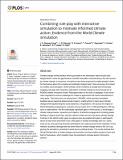Combining role-play with interactive simulation to motivate informed climate action: Evidence from the World Climate simulation
Author(s)
Fracassi, E.; Kapmeier, F.; Kurker, V.; Johnston, E.; Jones, A. P.; Rath, K.; Rooney-Varga, Juliette N; Sterman, John; Franck, Travis; ... Show more Show less
Downloadjournal.pone.0202877.pdf (4.207Mb)
PUBLISHER_CC
Publisher with Creative Commons License
Creative Commons Attribution
Terms of use
Metadata
Show full item recordAbstract
Climate change communication efforts grounded in the information deficit model have largely failed to close the gap between scientific and public understanding of the risks posed by climate change. In response, simulations have been proposed to enable people to learn for themselves about this complex and politically charged topic. Here we assess the impact of a widely-used simulation, World Climate, which combines a socially and emotionally engaging role-play with interactive exploration of climate change science through the C-ROADS climate simulation model. Participants take on the roles of delegates to the UN climate negotiations and are challenged to create an agreement that meets international climate goals. Their decisions are entered into C-ROADS, which provides immediate feedback about expected global climate impacts, enabling them to learn about climate change while experiencing the social dynamics of negotiations. We assess the impact of World Climate by analyzing pre- and post-survey results from >2,000 participants in 39 sessions in eight nations. We find statistically significant gains in three areas: (i) knowledge of climate change causes, dynamics and impacts; (ii) affective engagement including greater feelings of urgency and hope; and (iii) a desire to learn and do more about climate change. Contrary to the deficit model, gains in urgency were associated with gains in participants’ desire to learn more and intent to act, while gains in climate knowledge were not. Gains were just as strong among American participants who oppose government regulation of free markets–a political ideology that has been linked to climate change denial in the US–suggesting the simulation’s potential to reach across political divides. The results indicate that World Climate offers a climate change communication tool that enables people to learn and feel for themselves, which together have the potential to motivate action informed by science.
Date issued
2018-08Department
Massachusetts Institute of Technology. Department of Civil and Environmental Engineering; Massachusetts Institute of Technology. Institute for Data, Systems, and Society; Sloan School of ManagementJournal
PLOS ONE
Publisher
Public Library of Science
Citation
Rooney-Varga, J. N., J. D. Sterman, E. Fracassi, T. Franck, F. Kapmeier, V. Kurker, E. Johnston, A. P. Jones, and K. Rath. “Combining Role-Play with Interactive Simulation to Motivate Informed Climate Action: Evidence from the World Climate Simulation.” Edited by Felix Creutzig. PLOS ONE 13, no. 8 (August 30, 2018): e0202877.
Version: Final published version
ISSN
1932-6203